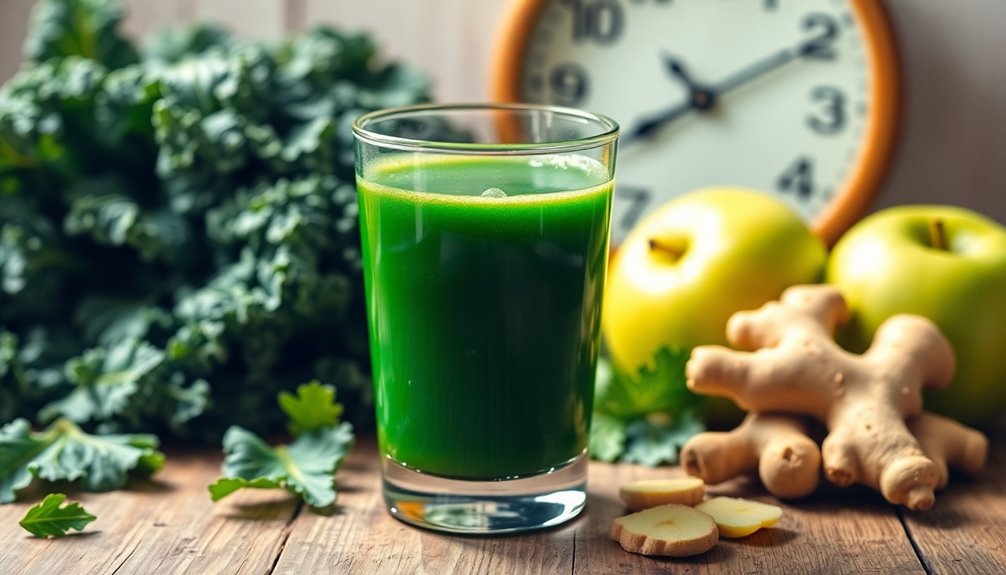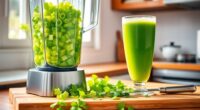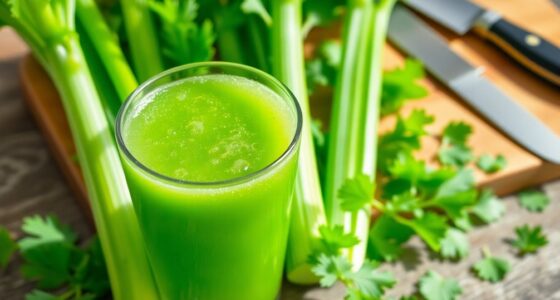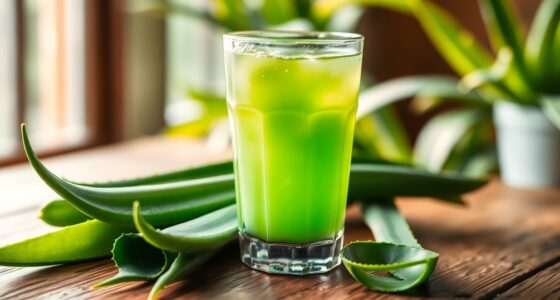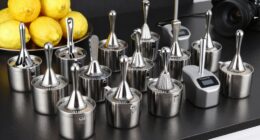Green juice typically lasts 3 to 5 days in the fridge when stored properly. To keep it fresh, use airtight glass containers and fill them close to the brim to limit air exposure. Store it at the back of the fridge, away from light and temperature fluctuations. Remember, if you notice a foul smell, murkiness, or an unpleasant taste, it's time to dispose of it. Want to know more tips for preserving your juice?
Key Takeaways
- Cold-pressed green juice can last between 3 to 5 days in the fridge, while centrifugal juicer juices should be consumed within 24 to 48 hours.
- Store juice in airtight glass containers filled close to the brim to minimize oxidation and preserve freshness.
- Keeping juice at temperatures below 45°F (7°C) helps extend its shelf life and maintain nutritional quality.
- Signs of spoilage include foul smell, darker appearance, unpleasant taste, and visible separation; discard juice if these occur.
- Adding acidic ingredients like lemon juice can act as a natural preservative and enhance the flavor of green juice.
Understanding the Shelf-Life of Green Juice

When you make cold-pressed green juice, it typically lasts about 3 to 5 days in the fridge, but juices from centrifugal juicers should be consumed within 24 to 48 hours.
The shelf life of juices is influenced by the quality of the produce and storage conditions. Keeping your fresh juice at a temperature below 45°F (7°C) is essential to extend the shelf life and maintain its nutritional quality. Adding acidic ingredients like lemon juice can help preserve your juice, as higher acidity levels usually correlate with longevity. Additionally, detoxifying juices can be particularly beneficial for enhancing your overall health and wellness while ensuring freshness.
Watch for signs that your juice has gone bad, such as off smells or a murky appearance. If you notice these changes, it's best to discard it for safety.
Tips to Extend the Freshness of Green Juice
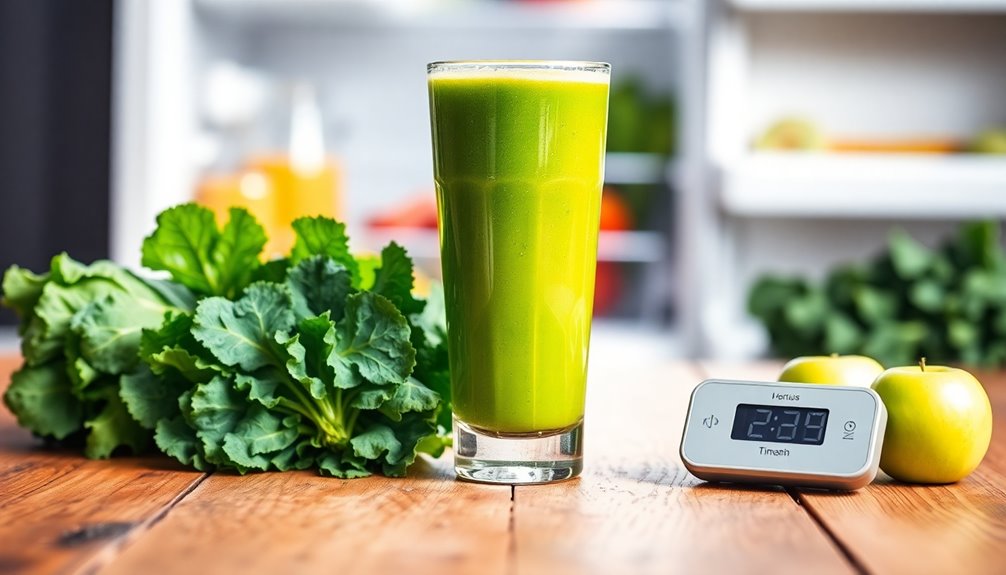
To keep your green juice fresh for as long as possible, focus on proper storage techniques. Using airtight glass containers is essential to preserve juice by minimizing oxidation. Fill those containers close to the brim to limit air exposure. Store your juice at the back of the fridge, where it's coolest and most consistent in temperature, ideally below 41°F (5°C). Avoid light and temperature fluctuations, as they can degrade nutrients quickly.
| Storage Tip | Benefit | Result |
|---|---|---|
| Airtight containers | Reduces oxidation | Longer shelf life |
| Fill to the brim | Minimizes air contact | Maintains freshness |
| Keep in the back | Consistent temperature | Preserves nutrients |
Additionally, consider using high-quality containers that are designed to minimize exposure to light, which can help maintain the nutritional integrity of your juice. Consume your juice within 3 to 5 days for peak quality!
Comparing Green Juice to Other Fridge-Stored Items
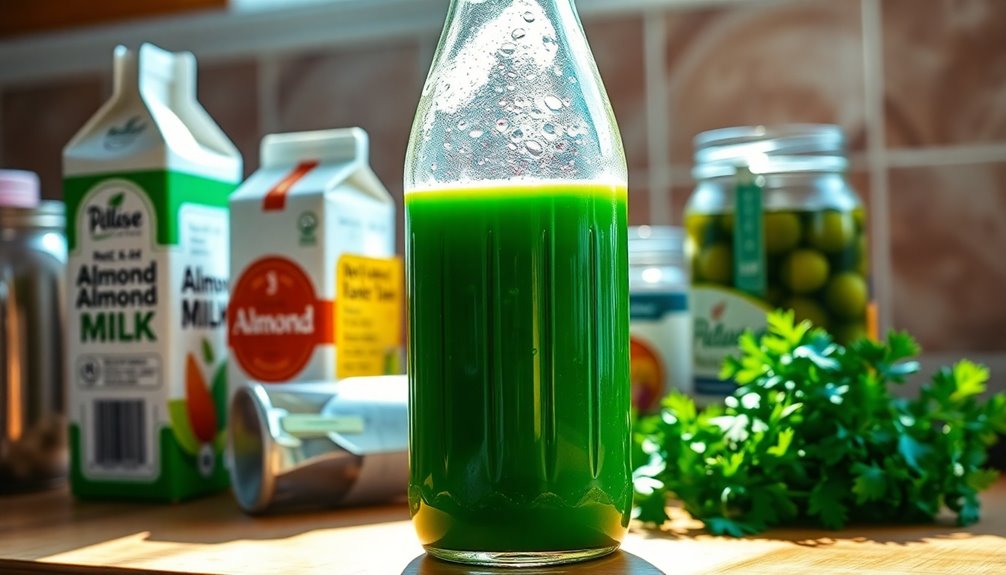
While proper storage techniques can greatly extend the freshness of your green juice, it's important to recognize how its shelf life compares to other fridge-stored items. Typically lasting just 3 to 5 days, homemade juices, particularly green varieties, spoil much faster than items like pizza sauce, which can last weeks.
Juice companies often use high pressure processing (HPP) to enhance shelf life, but natural juice is still more perishable. Fresh vegetables in your green juice contribute to this quick spoilage, making timely consumption essential.
Unlike other foods that may remain safe longer, the Vitamin C content in your green juice diminishes rapidly. Understanding these differences helps you maintain quality and taste, ensuring you enjoy the full nutritional benefits.
Signs Your Green Juice Has Gone Bad
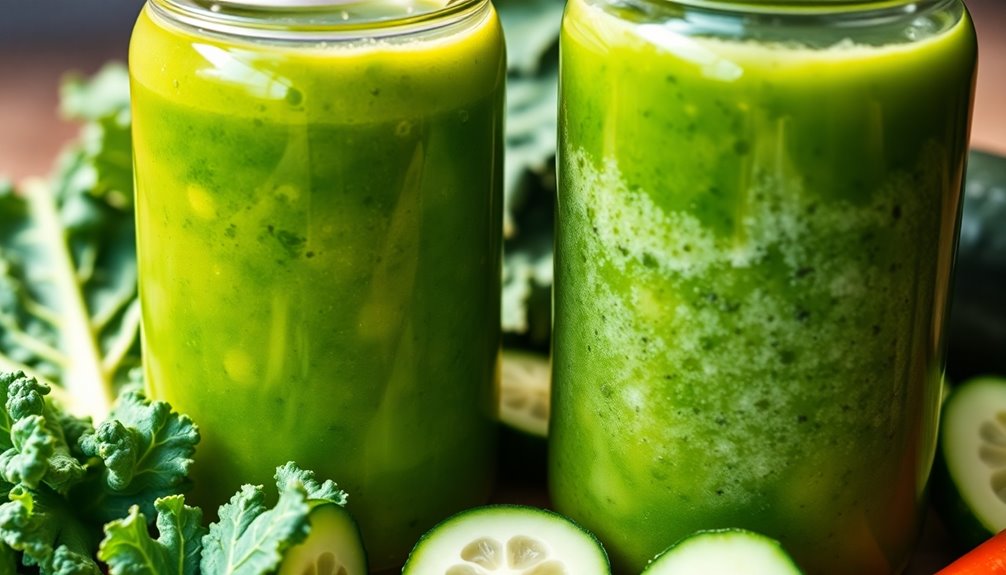
How can you tell if your green juice has gone bad? First, trust your senses. A foul smell is a clear indication of spoilage, signaling it's time to toss it.
If you notice a darker appearance or murkiness compared to when it was freshly made, it's likely no longer safe to drink. An unpleasant taste or aftertaste is another strong sign of spoilage, so give it a taste test before consuming.
Additionally, look for visible separation or sediment at the bottom of the container; this can hint at bacterial growth. Regularly checking for these signs can help keep your juice safe and fresh.
Preserving Juices With Natural Methods
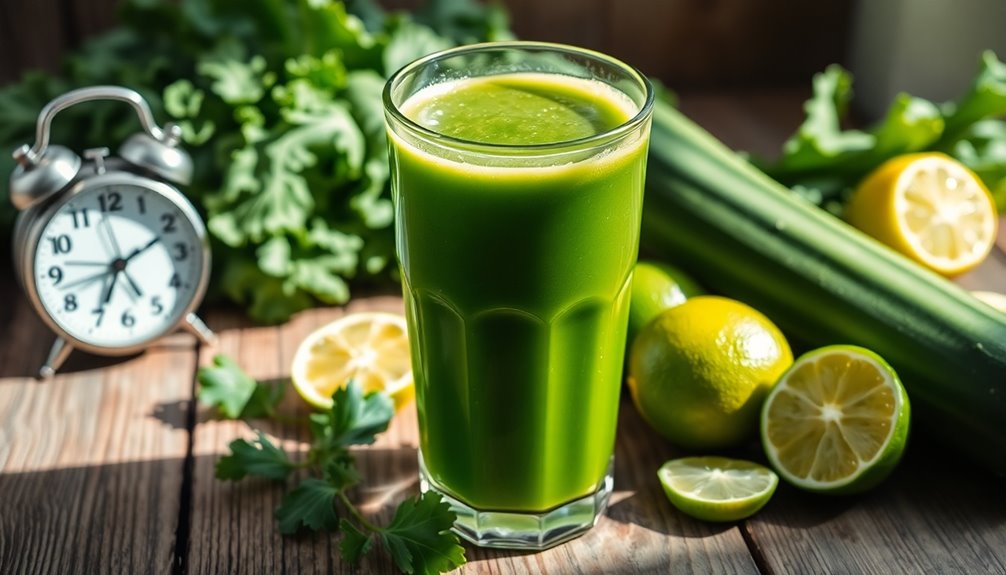
Spoilage can be a real concern when it comes to green juice, but there are plenty of natural methods to preserve its freshness and nutritional value.
One effective way is by adding lemon juice, which not only enhances flavor but also acts as a natural preservative due to its high vitamin C content.
Make sure to store your juice in airtight glass containers filled to the brim to minimize air exposure. Utilizing a vacuum sealer can also help by reducing oxidation.
Incorporating citrus fruits like lime or pineapple can further extend shelf life. Quick chilling after juicing is another method for prolonging freshness, allowing juice that’s packed with nutrients to last for up to a week. Additionally, adding ingredients rich in antioxidants can help further protect the juice’s nutritional quality. To maximize the fresh lime juice shelf life, it’s important to store the juice in airtight containers and keep it in the refrigerator. This helps minimize exposure to air and light, both of which can degrade the quality over time. Furthermore, consider freezing portions of the juice for long-term storage, as this method can preserve the flavor and nutrients for several months, ensuring that you always have a nutritious option on hand.
Frequently Asked Questions
How Long Does Fresh Green Juice Last?
Fresh green juice typically lasts about 3 to 5 days in your refrigerator if you store it properly.
However, if you use a centrifugal juicer, it's best to drink it within 24 to 48 hours.
Factors like the quality of your produce and how you store the juice impact its longevity.
For cold-pressed juice, you might get up to 7 days, but its freshness and nutrients decline after 3 to 5 days.
How Long Do Pure Green Juices Last?
Pure green juices typically last about 3 to 5 days when you store them in the fridge under ideal conditions.
If you use airtight glass containers, you might extend that to a week.
If you're using centrifugal juicers, try to drink the juice within 24 to 48 hours since it oxidizes faster.
Always check for foul odors, murky appearance, or separation to verify your juice is still fresh before consuming it.
How to Tell if Green Juice Is Bad?
To tell if your green juice is bad, trust your senses. If it smells foul, it's time to toss it.
A darker or murkier appearance also signals spoilage. Take a sip; if it tastes off or has an unpleasant aftertaste, don't risk it.
Look for visible separation or sediment—these are clear indicators that your juice isn't safe anymore.
Regularly checking for these signs helps guarantee you enjoy only fresh, safe green juice.
What Juices Have the Longest Shelf Life?
When it comes to juices, some can really stand the test of time.
If you're looking for longevity, high-pressure processed (HPP) juices can last 30-45 days in the fridge.
Citrus juices, thanks to their acidity, also extend shelf life.
Ultra-pasteurized (UHT) juices can last up to 6 months without refrigeration.
Juices with preservatives can also hold up longer, but they mightn't fit your natural juice goals.
Choose wisely!
Conclusion
In summary, understanding the shelf life of your green juice is crucial for enjoying its freshness. By recognizing signs of spoilage, taking steps to extend its longevity, and comparing it to other items in your fridge, you can savor every nutrient-packed sip. Remember, fresh juice brings energy, while spoiled juice brings regret. So, embrace the crispness, cherish the flavor, and always prioritize your health—because every gulp should nourish, invigorate, and delight!
Cindy thoroughly researches juicing trends, techniques, and recipes to provide readers with practical advice and inspiration. Her writing style is accessible, engaging, and designed to make complex concepts easy to understand. Cindy’s dedication to promoting the advantages of juicing shines through her work, empowering readers to make positive changes in their lives through the simple act of juicing.

